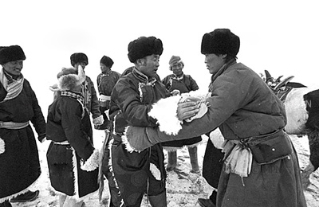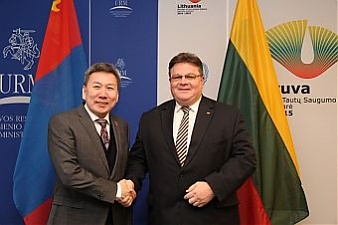Tsagaan Sar, literally translated to ‘White Moon/Month’ is Mongolia’s Lunar New Year Celebration. Every
year, Mongolians celebrate the ‘Tsagaan Sar’ that falls on different dates each year between winter and
spring (the exact date depends on the lunar calendar) somewhere between January 30 and February 27.
2014 Mongolia’s New Year Day will arrive on January 31, 2014. The ‘Year of the Water Snake’ has finished and the ‘Wooden Horse Year’ begins. The holiday is celebrated throughout Mongolia for three days. Tsagaan Sar is a holiday that celebrates the end of winter and serves to welcome a flourishing new year. Mongolians believe that success and luck for the coming year will be determined by how people spend the Tsagaan Sar Holiday. Moreover, Tsagaan Sar welcomes the new year by preserving rituals from ancient times and remains a significant nationwide holiday for consolidating social relations and networks.
In addition, Tsagaan Sar brings together family and friends – the problems and tribulations between
each other are put behind them and you start over fresh – you do not bring previous problems forward into the New Year.
History of Tsagaan Sar
The origins of Tsagaan Sar predate the Great Chinggis Khaan. The Mongols of olden times were in touch
with nature to a great degree. Their life and life styles were connected intimately with the earth and sky as
well as the seasons. They called them Mother Earth and Father Sky. They judged the season by the colors of the earth and its growing things–by the sharpness of the winds, by the positions of the moon, stars as well
as the sun. Taking positions of the stars for direction using the sun and the moon, they created nature’s clock
and their monthly as well as yearly calendar. The hours of the day and the years were named after animals,
days and months were named after colors. Noted in Marco Polo’s journal from the time of Khubilai Khaan were entries about Mongol traditions and he noted that the last month of the old year was called the black month as it was the coldest, darkest and had the shortest days of any month of the year.
Also, the next month was called the white month as it was the beginning of the end of winter and the beginning of a new year with spring soon to come.
In olden times before Chinggis Khaan, the Mongols celebrated in the fall of the year at the end of summer
the gracious bounty they had gathered and collected from the produce of their animals–various dairy products as well as dried and cured meats along with wild herbs, berries and other root crops. They would hold this harvest celebration before the onset of the long cold brutal winter ahead. In 1206, Chinggis Khaan was named Great Khaan and Ikh Mongol (Great Mongol) the country of Mongolia was created. At that time he moved the harvest celebration which was celebrating the end of the summer beginning fall to the dates that it is celebrated now which is the beginning of spring (white month) to celebrate the new life such as fresh grass, flowers blooming, baby animals being born. This is also to celebrate the birth of a new nation and the inauguration of the Great Khaan.
Tsagaan Sar symbolizes an abundance of milk; and for Mongolians, this is the reason they have always revered white. From times of old the Mongols have held the sayings of Mother Earth and Father Sky – as the Mother gives milk to her young the Mongols thank Mother Earth for her gifts of dairy products from the animals they keep – they give thanks by casting small amounts of milk to the four corners of the sky (compass directions). Mongols believe that milk is pure as it is white and without blemish and so they offer it as a blessing to God.
When someone is going on a long journey or perhaps to be assigned to the army, their Mother will usually
cast the milk to the sky and pray for a safe trip, to keep them safe and bring them back home safely. The same will hold for all special occasions like weddings or other special or serious times. The milk prayer will keep their way clean and safe. During Mongolia’s communist period, the government banned Tsagaan Sar and tried to replace it with a holiday called ‘Herder’s Day’, but the holiday was practiced again after the 1990 Democratic Revolution in Mongolia.
How the Tsagaan Sar is celebrated?
People prepare for Tsagaan Sar months ahead by cleaning everything possible. herders deliver new births
around this time from their herds of animals which are considered a blessing. Everything must be clean
even your language. Do not sew old clothes during this time, sew new clothes. If you owe money pay it back
before Tsagaan Sar, do not owe anyone anything. In addition, everyone is expected to heal quarrels and fill
every container in the house. All the remaining tasks that you have left, you need to finish before Tsagaan Sar
starts. Food for Tsagaan Sar festivity is unique. Every family makes several hundred to several thousands buuz (dumpling cooked by steaming) or bansh (small dumpling cooked by boiling): they prepare plenty of food for all relatives, neighbors and friends that visit the family. Food at Tsagaan Sar consists of brown and white foods – brown foods include meat, flour dumplings etc and alcohol. White foods are dairy products, cookies and alcohol made from mare’s milk called airag. Families put a feast of sheep rump, layers of traditional pastry (cookies) that erected on large plates by odd numbers and decorated with candies and dairy products, milk tea, airag, rice cooked with curd, steamed and boiled dumplings and much more
on the table.
The day before Tsagaan Sar is named ‘Bituun’ or no moon day. Bituun day families set up their tables,
people come over to show their respect and to honor their elders. Bituun night meal is started by eating foods of the brown category. You eat brown foods first as the old year and all the bad things associated with it are gone. After brown food you consume white dairy food so you will be ready for the year, new day and new moment. On Bituun evening, the oldest person in the family is honored by all the extended family coming to their home to share food and play games such as Shagai. This is the celebration of the end of the old year – you always eat until you are full – this day you will not sleep over at someone else’s home
because your own home is important on this day – you do not want to leave it empty, so you return to sleep.
The day after Bituun is called Tsagaan Sar or New Year’s day. People get up early as the sun is rising
– all people put on new clothes – make new milk tea – the lady of the house takes milk tea outside and cast it to the four directions of the compass while praying for a good year. After this, all the members of the family with exception of husband and wife greet each other beginning with the oldest (husband and wife are considered one person so they don’t need to be greeted by each other). They are greeted by saying ‘Ta amar mend baina uu?’ which means ‘How are you doing?’ The older person’s arms go on top and the youngest go on the bottom like you are going to carry them holding their elbows. Elders are given a ‘Hadag’
which is a blue or white silk scarf, as a sign of deep respect and are wished good health and long life.
The answer back to the first greeting is ‘Amar mendee’ which means I am fine, I am good. This day people of the same age greet each other with one arm on top and one arm on the bottom. Pregnant women do not greet each other like this during their pregnancy as they believe their unborn child’s sex could be switched.
After the greetings are finished guests and family will be seated at the table – guests will open their hoorog
(snuff bottle) and will partially open the top and present it to their host and say ‘Ta saihan shinelj baina uu?’
Which means ‘how is your new year going?’ The host will say ‘Saihan saihan’ which means ‘good, good.’
Afterwards, the host sniffs at the lid and passes it back or if he wants, he can remove the top and take some of the snuff and sniff it up a little of the powder – it is up to each person on how they do this. The symbolism of the passing of the snuff bottle is new friendship and honoring friends and family. This day the first food that is eaten is white food (dairy foods) this means good luck, blessed life and good things coming for you. This day do not talk about any negative things, always be positive do not get angry. Each person gives gifts on Tsagaan Sar – not expensive material gifts – but things that you have – cookies, dairy products or any natural products. Mongolians usually avoid gifts of dark colors, and prefer not to give a single
item.
During Tsagaan Sar celebrations there are three things that you cannot do – first you cannot be angry – the
second is to not be greedy and the third is not to be sad. You clear your mind and spirit of all negative things
and open it up to pure clean positive thoughts. During these days you always help people and give with an
open heart. If people will truly follow and observe these customs, putting old problems behind them and looking forward to the future without negative thoughts or preconceived notions the world and their lives would be truly remarkable. After the greeting ceremony, another feast starts among the family.
When finished, people visit each other’s homes in order of age (youths go elders’ home to greet) and are
offered dumplings, milk tea etc. The hosts of the family generally provides gifts for the visitors. This way, the
feast continues (officially for three days, but in practice, it often goes on much longer when family members
travel long distances to greet one another). As the celebrations wind down, family and relatives repeat their
wishes for good health and happiness and that the incoming year will be peaceful without suffering or hatred.
Happy Tsagaan Sar !











 Little evidence has been found of avian or equine influenza infecting humans, in a study carried out in Mongolia.
Little evidence has been found of avian or equine influenza infecting humans, in a study carried out in Mongolia.




